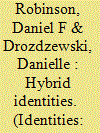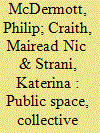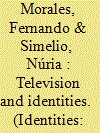| Srl | Item |
| 1 |
ID:
147002


|
|
|
|
|
| Summary/Abstract |
This study investigated the relationship between self-reported discrimination and ethnic identity among 61 Arab American adolescents between the ages of 12 and 18 years. Participants completed the Multigroup Ethnic Identity Measure (MEIM) to obtain an assessment of their ethnic identities. Additionally, the lead author developed a questionnaire asking participants to self-report if either they or another Arab student they knew had been ‘treated badly or differently because of their ethnicity’. Consistent with the rejection-identification model, respondents who had reported experiencing discrimination, knowing of others who had experienced discrimination, or both had higher ethnic identity scores than those who had not, although the only significant difference was found between the group that experienced both types of discrimination and the non-discrimination group. Implications of these results are discussed as well as directions for future research.
|
|
|
|
|
|
|
|
|
|
|
|
|
|
|
|
| 2 |
ID:
147004


|
|
|
|
|
| Summary/Abstract |
The Moken and Moklen are an indigenous population residing along the Andaman coast of Thailand. They have been represented, both in popular and academic discourse, as seafaring nomads living in traditional boats and small temporal coastal communities. The overwhelmingly precept of the existing literature about the Moken is one of vulnerability and of stemming the erosion of ‘authentic’ Moken cultural identities. Identification of Moken as being under threat transpired as a consequence of the 2004 Asian tsunami, in which many Moken were killed and the plight of others who had their houses and sources of livelihood destroyed was propelled onto an international stage. This paper critically discusses how Moken identities and associated discourses of vulnerability have been depicted in media and academic literature as fixed and traditional. We argue that such rigid identity narratives contrast sharply to the contemporary realities of the Moken identities as articulated by the Moken we interviewed.
|
|
|
|
|
|
|
|
|
|
|
|
|
|
|
|
| 3 |
ID:
147009


|
|
|
|
|
| Summary/Abstract |
Using the case study of Derry~Londonderry and its designation as ‘UK City of Culture 2013’, the primary objective of this research paper is to critically analyse the challenges associated with the production of a year-long cultural programme in a culturally and politically divided place. Given that Northern Ireland’s second largest city has been understood in terms of a conflict between ‘two traditions’, Irish/Catholic and British/Protestant, we critically assess the dialogue and policy negotiations with reference to public places as well as representations of collective memory and traditional music during the year. Fieldwork over two years has enabled us to investigate how culture and identity politics are played out in the context of a city undergoing a process of reconciliation. Placing our case study in a strongly comparative context, we argue that cultural concerns are pivotal points of (re-)negotiation in any society transitioning from conflict to ‘peace’ and that this issue, therefore, is of vital concern to academics and policymakers alike internationally.
|
|
|
|
|
|
|
|
|
|
|
|
|
|
|
|
| 4 |
ID:
147006


|
|
|
|
|
| Summary/Abstract |
In the context of increasingly ‘culturalised’ discourses on immigrant integration in Europe, this article aims to contribute to a de-essentialised understanding of ethnic and religious identity. Based on the analysis of quantitative data, it reveals the multifarious relationship between identification and culture among second-generation Turkish and Moroccan Dutch in the Netherlands. Some instances of self-identification with nominal labels (‘Turkish’ and ‘Muslim’) appear to go hand in hand with stronger sociocultural orientations in daily life and are more substantive; others (‘Moroccan’) do not. These findings point to different social mechanisms at work in shaping identifications with certain identity labels and once more illustrate that ethnic and religious identifications do not necessarily reflect cultural ‘otherness’.
|
|
|
|
|
|
|
|
|
|
|
|
|
|
|
|
| 5 |
ID:
147007


|
|
|
|
|
| Summary/Abstract |
This article analyses the consumption of ‘telenovelas’ by Latin American residents in Spain. Our hypothesis is that ‘telenovelas’ are a way of constructing identities especially in communities that have emigrated to other countries and which can be seen in their specific viewing preferences for fiction. We have carried out a survey following the methodology applied in these kinds of studies. The survey was applied to 219 Latin American subjects who reside in Spain. We demonstrate that the main factors influencing the consumption of ‘telenovelas’ by the Latin American community residing in Spain are related to the cultural identities of the countries of production and which are represented in the context of the different storylines, such as natural locations, costumes and language. The results show that further research in this field is needed in order to identify the derivations of perceptions by the immigrant collectives through successful products such as ‘telenovelas’.
|
|
|
|
|
|
|
|
|
|
|
|
|
|
|
|
| 6 |
ID:
147005


|
|
|
|
|
| Summary/Abstract |
Poland and Ukraine jointly hosted the European Football Championship in 2012. The Polish media and government portrayed Euro 2012 as the culmination of the post-communist transformation that started in 1989, a great national celebration and proof that Poland belonged to the family of ‘modern’ nations. Drawing on ethnographic research, we look beyond the official discourse and analyse Euro 2012 ‘from below’ in our paper. We focus on analysing the different meanings attributed to Euro 2012 in Poland in the context of the dominant discourse. Referring to Stuart Hall, we distinguish and analyse three readings of Euro 2012, namely the dominant (‘celebrators’), negotiated (‘indifferentists’, ‘modernisers’) and oppositional (‘radical nationalist’, ‘rebels’) readings.
|
|
|
|
|
|
|
|
|
|
|
|
|
|
|
|
| 7 |
ID:
147001


|
|
|
|
|
| Summary/Abstract |
Based on fieldwork in Guangzhou, this paper documents the activities of a group of African women traders, highlighting their role in constituting globalisation from below or a counterhegemonic globalisation that emanates from China. It further builds on previous studies on women and development to show how neoliberal economic changes in Africa since the 1980s have forced African men into the traditionally feminine role of (informal) traders between Africa and China. Struggles for economic power between African women and men traders and representations of gender in such struggles as well as the construction of a hyper-masculine discourse in the Guangzhou context are analysed in discussing how women and men are engaged in a continual process of ‘making gender make sense’ outside of Africa.
|
|
|
|
|
|
|
|
|
|
|
|
|
|
|
|